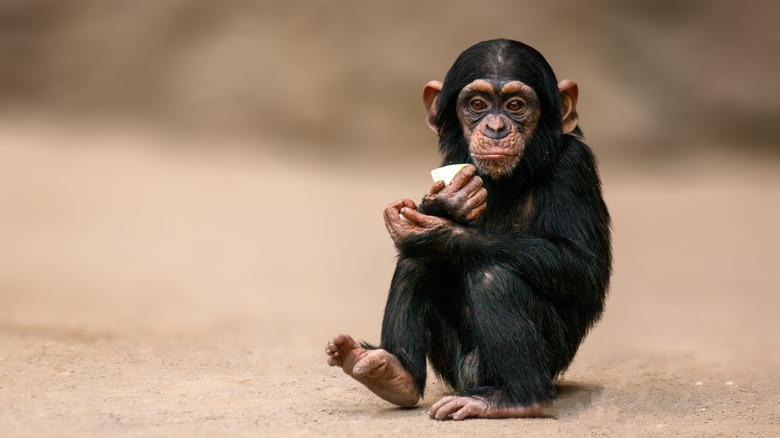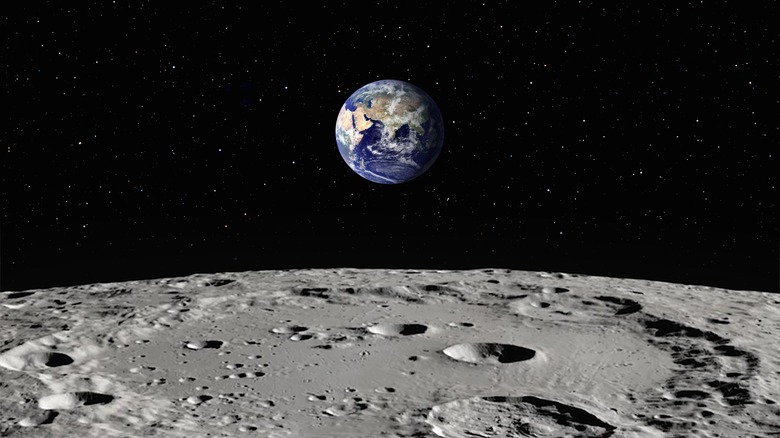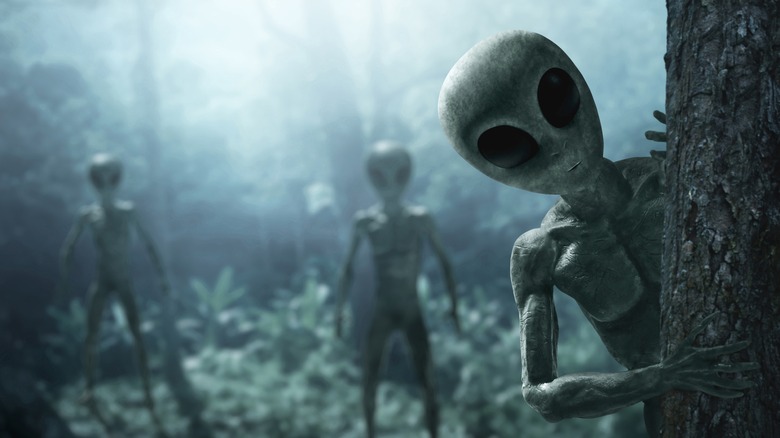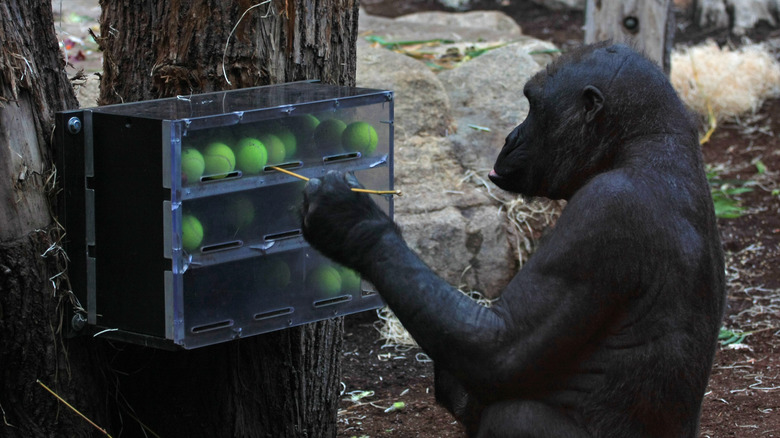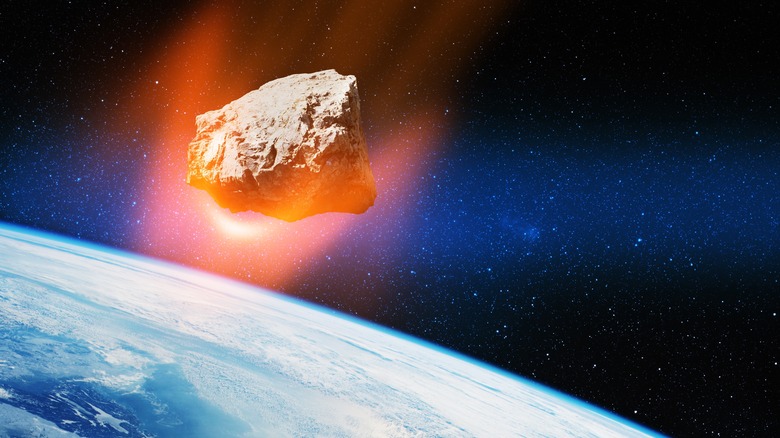Could Another Intelligent Species Ever Arise On Earth?
Let's be honest: doom and gloom are the norm these days, especially when thinking of the future of our species, Homo sapiens. You can take your pick of an endless ream of potential apocalypses: global warming and rising sea levels, AI dictatorships, economic collapse, nuclear holocaust, pandemics far worse than COVID-19, and so on. Some folks seem to think our end is inevitable, while others are a bit more optimistic.
The truth is that even without manmade contributions, entire species have life spans. Research published on ScienceDirect describes the average life span of invertebrates — snails, bees, earthworms, sea anemones, etc. — as about 11 million years. Mammals of any type? Just 1 million years. Maybe that's because cockroaches seem way, way hardier than humans. We apes, on the other hand, are squishy and high-maintenance but super cooperative. Heck, have you ever seen those iPhone things? One person in a room can only accomplish so much, no matter how genius.
In the end though, regardless of intelligence, all species go extinct. This is the natural cycle of biological life in a universe with lots of "free energy" to go around, as ThoughtCo explains. Each species passes on the torch of consciousness. So if humans bite it, is there a chance that another species will take our place as Earth's standard-bearer? The answer, predictably, is complicated. It's also likely to be "no."
Earth's expiration date
"But wait!" you say. "What about that video on YouTube of an orangutan driving a golf cart? Why, if humans all died, she could just throw on a suit and go to Wall Street, or head up research into particle physics at CERN in Switzerland. It'd be like those new 'Planet of the Apes' movies, but with fewer chimps on horses dual-wielding machine guns." Not quite. To understand why, we've got to turn to something that lots of folks detest: math.
See, our beautiful planet Earth has existed for about 4.5 billion years, as Space says. Our sun is about the same age — 4.6 billion years old — and has about 5 billion years left before it runs out of hydrogen fuel and starts burning helium, also per Space. This is when it'll swell into a red giant and consume Earth. So you might figure there's plenty of time for another species to evolve and replace us if we go extinct. Unfortunately, as The Conversation explains, the cut-off for intelligent life existing on Earth is closer to 1 billion years because of changes to the atmosphere that'll occur as the sun gets older. Science Focus estimates a much lower 150 million years. Simply speaking, this means there might not be enough time left in Earth's life cycle for another species to reach a self-aware, civilization-building state. If and when this does happen, the Earth might already be on its deathbed.
The unlikelihood of now
Another key reason why non-human intelligent life on Earth might not become self-aware, use technology, and build civilizations? The sequence of events that gave rise to humanity might have been so excessively unique, so uncannily improbable, that it could be why we don't see a galaxy teeming with intelligent life. So far, Earth is unique in a Milky Way with, at minimum, 100 billion stars, per NASA. This conundrum is defined as Fermi's paradox, per Live Science.
To illustrate the point, here's a list of what was necessary to bring us to the present: a rocky planet with plate tectonics, a large moon, and a suitable distribution of life-bearing chemicals that exists in a solar system's habitable Goldilocks zone (via Las Cumbres Observatory); the rise of the first self-replicating cellular components from inorganic material; single-celled life becoming multi-cellular, complete with energy-producing mitochondria; an evolutionary path that yielded sexual reproduction (via Biologywise); the formation of live-birth mammalian life; the branching off of hyper-cooperative and intellectually flexible primates whose eventual bipedalism freed up hands for tool use; the neurological formation of speech centers that allowing verbal communication; the transition from hunter-forager to agriculture and animal husbandry; every single technological and societal advance needed to bring us from the plow to the spaceship (via The Conversation). On and on it goes.
Maybe that list alone is enough to drive home the point. Even chimps, bonobos, and orangutans — our closest relatives — have already taken different evolutionary routes.
Non-human human candidates
But wait, you say. Why must another intelligent species be ape-like? What about intelligent one-dimensional strings of cosmic whatever-whatever energy? What about those gray alien dudes and their fascination with humans? Heck, what about elephants? They're hyper-social, cooperative, use tools, and hold funerals for the dead — they're basically four-legged people. They even take detours during their endless roaming to visit spots of former funerals and pay respects, as National Geographic details. On this point, we look to "convergent evolution." For instance — birds fly, bats fly, moths fly, etc. Different species developed the same characteristic to achieve the same end: flight. Traits such as wings, horns, fins, etc., resulted from similar environmental pressures that drove evolutionary success across different species in equivalent ways, as Live Science overviews.
So what about humans? The Smithsonian lists 21 potential human species that have existed since our earliest progenitor race some 6 million years ago. Now there's just us. But are we — with our shelter from the elements, non-stop procreation, and the glue of belief and culture — truly the best this planet has to offer? Well, as a study published by Cambridge University Press posits, all life everywhere may develop in the same way, including intelligent life. If you want to fly, there are only a couple of possible biological options. And if you want to build civilization, an elephant might not cut it. If humanity goes belly up, the great Earth consciousness experiment may be gone forever.
The nature of intelligence
It's time to dig a bit deeper into what we mean by "intelligence." Elephants hold funerals and drop rocks onto electric fences to tear them down, crows use bits of twigs like tools and toss nuts onto streets for cars to run over and crack open, and octopuses solve all sorts of novel, complex problems, per Live Science. All of that sounds pretty intelligent. At the very least, these species and others might outlast humanity. And before Earth's life cycle comes to a close, other similarly intelligent creatures may arise.
But as we've more or less stated, this article takes intelligence to mean the capability to create civilization. Building things from raw materials, crafting religious rituals, putting verbal language into writing, contemplating abstract notions like "justice:" these skills are worlds apart from tossing nuts onto streets for cars to run over. That's not to belittle the capabilities of our animal kin, nor lord over them like planetary bullies prizing our own talents above all others. There's just something obviously unique about the kind of cognition, learning, and planning capabilities that built the pyramids, split the atom, and synthesized antibiotics.
On that point, SyFy discusses the cognitive tradeoff hypothesis. Chimps, for instance, have a more rapid recognition response than humans and a better short-term memory. We, however, have sacrificed these abilities for skills related to flexible thinking and long-term memory. History itself illustrates that it's this type of intelligence, not another creature's, that's needed to build civilization.
Rewinding the tape
Despite all improbabilities, there is one way intelligent life arises on Earth after us, even if we define intelligence as narrowly as the capability to build a civilization like ours. It all depends on how devastating the event is that kills us off, assuming that humanity expires from a catastrophe rather than dying on the evolutionary vine. The latter doesn't seem likely.
So imagine we've got an eraser and start scrubbing backward along the human evolutionary tree. We know we can't expect Bobo the gorilla to take over for us. So, we've got to erase back to our common ancestor some 6 million years ago, as Discovery outlines. Then we've got to assume that another, currently living species exhibits characteristics necessary to "regrow the branch," so to speak, taking into account differences in Earth's environment between then and now. Maybe 6 million years isn't far back enough to do this, though. Or maybe the catastrophe that kills humanity wipes out 10 million years of collective evolution — or 50 million. But we can't erase too much because Earth has a 1-billion-year limit on supporting life (via The Conversation) and a 150 million-year minimum (per Science Focus).
As Live Science says, some scientists think this has already happened, perhaps even hundreds of times. We just might be (one of) the lucky ones who survived to talk about it. But take heart: This would mean that intelligent life is much more resilient than expected.
